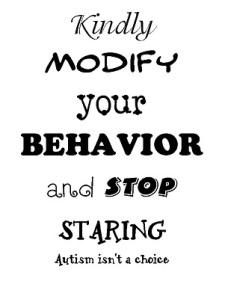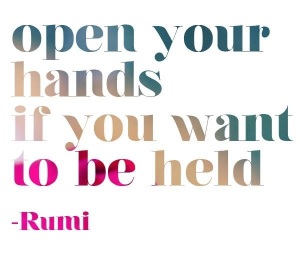This morning was a bit of a test, frankly.
As Teddy’s parents, we go through many different, ‘new’ experiences regularly. And today was one of them. There were, however, many lessons learned. Of course.
First, I’ll lay out the situation.
No nursery school this morning: Teddy had a hospital appointment. At 9 o’clock. In the next town. With four big brothers to get to school first. That, in itself, was a bit of a feat.
A hospital appointment is, to be blunt, one of the most difficult situations you can face with an autistic child. You can choose whether or not to go to a restaurant (and more often than not, we choose not – we’ve walked out of too many to particularly want to keep at it). But a hospital appointment for your child is something you cannot opt out of.
I decided it was best to ‘come prepared’. I peeled and chopped up some apple (Golden Delicious, the only type his diet allows) and put it in my handbag, along with a tub of homemade cookies (Ted-diet-friendly) and his cup of water.
Simply getting to the right place was a nightmare. Teddy is very big for a three-year old. He wears aged 4-5 clothes, and they won’t fit for long. He is quite a weight. While his daddy was getting change for the exorbitant hospital car park fee, we hurried to his appointment. Allowing Teddy to walk under such circumstances means myriad detours, sit-down protests and much delay, and we were already 10 minutes late. So I carried him.
I had assumed we would be in the same place we normally are, where there is a wonderful big waiting room for children, filled with toys of many descriptions, pens and paper and very few other people. But they turned me away – opthalmology is at the opposite side of the hospital, we were due 10 minutes ago, and after struggling to keep him with me whilst announcing our arrival, after he had run off into various different rooms he shouldn’t have been in, disturbed various different consultations, because the lady at reception kept talking to me and it is impossible to restrain him, we were placed in a waiting room full of other people, mainly adults. There was a rather woeful area for children in one corner, containing two toys and a play kitchen with all accessories missing. I made the mistake of switching on the Peppa Pig toy. Don’t get me wrong: Teddy was thrilled. There’s nothing he likes more than pushing the same button over and over to hear the exact same sound. Again and again.
I can’t say the same for the rest of the waiting room.
So, when he was distracted by something else, I switched it off.
Which is when he decided to run around the room, dragging his ‘nuggie’ (a blanket) behind him, trying to put his fingers in the whirring fans.
By this time, of course, as we have come to expect, the looks were beginning. The ones that say “Can’t they keep him under control?” or “What’s wrong with that child?” And my smile has become a bit more fixed, the stress levels have risen. And finally he was called.
The lady who saw him was an absolute sweetie-pie. But we had once again made assumptions we shouldn’t have. She was just the first of three. She was totally adorable with him, had obviously done this kind of thing before, managed to get him to cooperate by not being precious about what he touched or played with in her office. She was incredibly quick and efficient with the awful eye-drops to dilate his pupils.
But then.
Then we had a 20-30 minute wait until the eye-drops worked properly and we were seen by doctor number two. We didn’t want to go back into that awful waiting room. The walk to the other one, the other side of the hospital, would take 10 minutes at Ted’s pace and then require that we drag him away from the Wonderland of toys to fight and scream our way back again. We decided to try to tough it out on the chairs outside their rooms. We had brought the Kindle he loves playing on – it has puzzles and games that keep him very happy.
Normally.
But it also plays the alphabet videos he loves to watch and we had no wi-fi. And that, of course, was all he wanted to do. And there is no way he will sit still if he is not occupied.
So he began to roll along the floor. There’s nobody around. He’s not doing anybody any harm. We let him. He crawls a bit, gets up, walks to the doors at the end of the unpopulated corridor (all the busy-ness is the other end), says “Bye bye” and tries to open them, runs back to Daddy… To and fro.
I was relieved. He was running around an area empty of people or sensitive equipment, where he wasn’t disturbing anyone or getting into any trouble. He was mobile and therefore happy (though his “Bye bye” indicates his wish to leave, of course!)
And one of the staff asked me to stop him and keep him away from that end because it was where the theatres are and people needed access (which, of course, he wasn’t actually blocking).
At this point, I’m afraid, the rawness of the situation, my still newness to being an ‘autism mum’, the stress… I said “He’s autistic. I’m just trying to keep him happy and stop him disturbing anyone else.”
Then things started moving. He sat on his daddy’s knee (just) while I went to talk to them and they suddenly started bustling to see if we could be seen more quickly. My pent-up frustration with the nurse turned to admiration and gratitude as she began to move to get Teddy in.
Two more doctors were consulted – one who wanted to see if he would need glasses (thankfully he didn’t. Imagine keeping them on!) and another who wanted to decide if he needed an MRI scan, electrode-tests etc. Thankfully she, too, when faced with our assurances and the evidence of her own eyes that his eyesight and nystagmus were so vastly improved they were barely perceptible any more, decided he didn’t need them either.
Both of these experiences involved a lot of wrestling with a very strong small person, cajoling, exaggerated play: all ploys to try to get to see his eyes. He was an angel. Not that anyone without knowledge of autism would have seen it that way.
Job done. We left. With more than a sigh of relief.
So, exhausted and battle-scarred, these are today’s lessons:
1) Ascertain, before going to an appointment, exactly what you are going to be there for, and how long. Our appointment letter was vague in the extreme, no one had explained beforehand what would happen, and we had wrongly assumed it would be a one-person, in-and-out affair.
2) Visit the pound shop and stock up on small, entirely new toys just for the occasion. Had I not assumed we would be in the waiting room with all the toys, I might have thought of this in advance. It is amazing how long a new toy can distract. And as soon as the novelty wears off, a new one can be produced. This is a trick I learned many moons ago when flying with his big brother, then a young toddler. But it would work very well with Teddy.
3) People do not get autism. Nor can you expect them to. As our first doctor this morning remarked: “The problem with autism is that you can’t see it.” I have read on so many forums the enormously difficult experiences and comments parents of autistic children have to handle on a daily basis. People wrongly assuming it’s a ‘discipline problem’, ‘they don’t look like they have anything wrong’… I found myself, in that waiting room, wishing I were wearing a badge or, as that same doctor put it, had walked into the room and announced it. People may not get, just by looking at him, that Teddy will not behave as they expect, but if you tell them before they have a chance to disapprove, then they have the opportunity to exercise compassion rather than judgement. This is one of the fundamental lessons for me.
I appreciate, of course, that there are many different people in our world with many different challenges, many of which I don’t have the first clue about. But who becomes passionate about a cause? Someone who has experienced it, is living it, whose life has changed because of some association with it.
Through my relationship with Teddy, I have come to realise that his biggest challenge is not autism. His biggest challenge is the lack of awareness, through no fault of their own, of the society in which he lives, about autism. Were people to have a clue (and it is hard to express how grateful I am when I meet someone who does) about what it means to be autistic, Teddy’s immediate environment would, overnight, become a more accepting and hospitable one. And, by extension, families with autism would no longer feel that they live on the edge, on the outside looking in.









